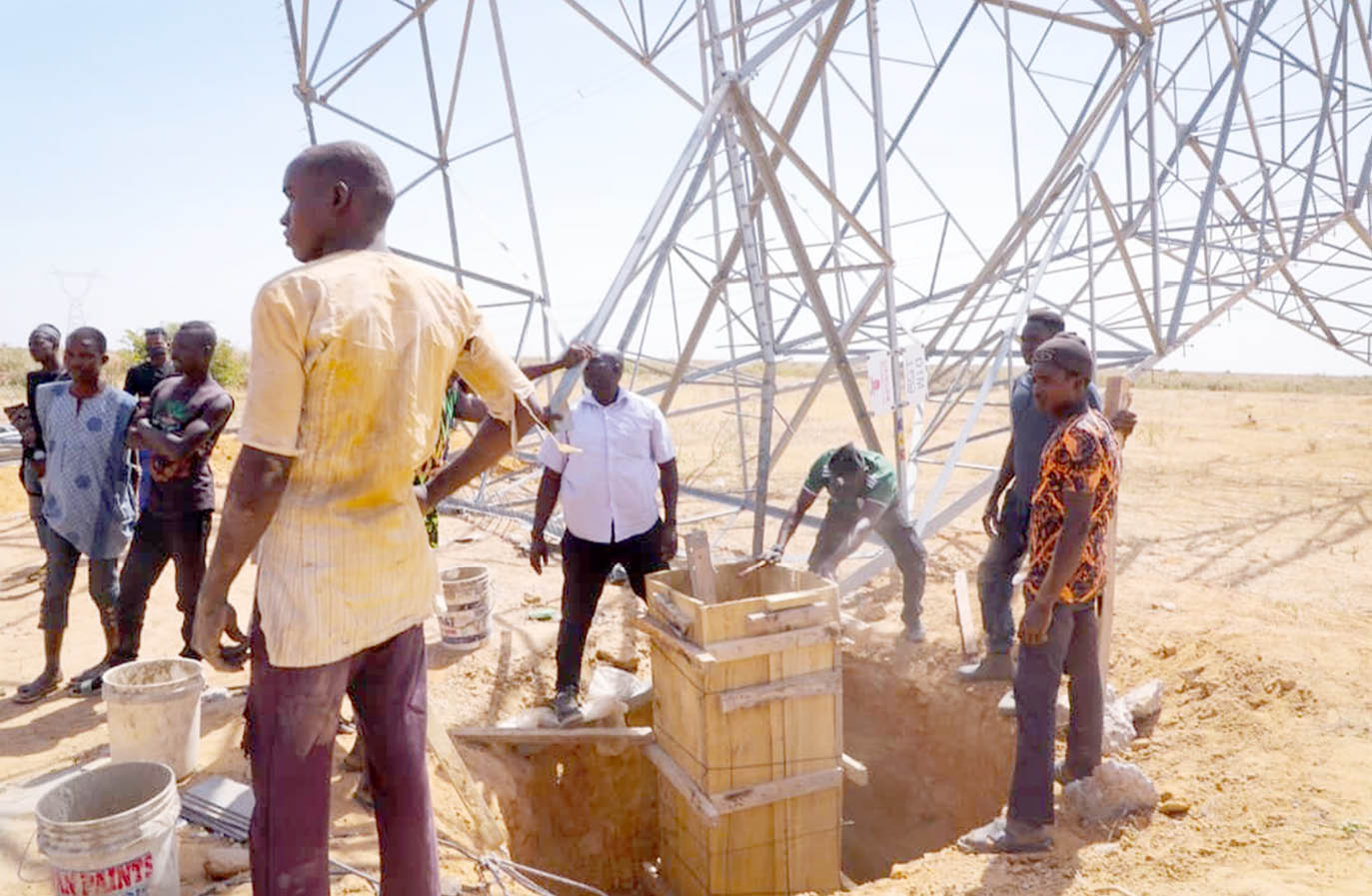For nearly a year, Maiduguri, the Borno State capital, has suffered power outage as a result of incessant attacks on transmission towers by insurgents.
The insurgents blew up the transmission towers, which supported and conveyed high-voltage power lines from Damaturu to Maiduguri and power supply was affected in the capital city and few adjoining towns, including Bama.
All the local government areas in northern Borno have been off grid for over two years following the destruction of transmission systems by insurgents.
The attack, which plunged Maiduguri into darkness, was carried out in February this year. Shortly after that attack, another facility was blown up and two power workers were injured. Subsequently, other towers were destroyed by explosives, including the most recent attack in September, in which one tower collapsed. All the attacks were reportedly carried out at night.
The Minister of Power, Abubakar Aliyu, represented by the managing director, Transmission Company of Nigeria (TCN), Sule Ahmed Abdulaziz, an engineer, at a town hall meeting organised by the Ministry of Information and Culture to address destruction of power and telecommunication infrastructure in Maiduguri on September 23, said that in the last nine months, the TCN had lost 848 megawatts per day, totaling N1.17 billion.
Revealing that an average of 330KV tower costs N110 million, he said eight 330KV single circuit transmission lines valued at N880m were vandalised by the insurgents from January 2021 till date.
Daily Trust on Sunday reports that the electricity outage has drastically affected business in Maiduguri metropolis, which is gradually recovering from insurgents’ attacks.
The situation is so bad that the company which delivers power to various organisations and homes for a fee is said to be running at a loss because it has not generated income in eight months as a result of the power cut.
An official of the Yola Electricity Distribution Company who will not want to be named said the company had been spending money on salaries and other charges despite the fact that it had not generated money in revenue during the period in question. He said the company had continued to lose huge sums of money monthly as a result of the outage.
He said, “The company is running at a loss because of the damages caused on the transmission towers monthly. For instance, from our Kanem, Yerwa and Bulunkutu business units, we generated close to N300 million monthly, but as we speak, we have not generated any income since February when the attack happened. The company intermittently suspended business in the past due to power outages as a result of tower collapse caused by the insurgents.”
He, however, said the TCN was working day in day out to fix the towers and restore electricity, even as the insurgents continued to carry out more attacks unabated.
He said a separate initiative was being handled by the Rural Electricity Board to transit 33Kv lines from a sub-station in Damaturu to Maiduguri as a temporary measure, pending the repair of the transmission towers.
“The workers gave three weeks within which they would complete the work, and I believe that other things being equal, they should be on the verge of completion. That will at least stabilise power,” he said.
A welder in Pompomari, Mohammed Nur, said the cost of doing business had increased as a result of the power outage, which forced him to rely on a diesel generator to fabricate and fuse metals. He said his customers had been complaining of price increase.
“Customers say our price is too high, but this is because we spend a lot of money on generator fuelling. Before the recent outage, which has lasted for almost eight months, I usually paid N15, 000 monthly to the utility company as electricity charges. But the supply has been cut by the insurgents and I have to continue with the welding business to earn money. I bought a diesel generator at the cost of N300,000 and spend at least N25,000 on fuelling, apart from other maintenance costs. This is in addition to the daily increase in the cost of working materials.”
A civil servant in the state said all public organisations relied on generators or solar systems to power their offices, and the situation has increased spending on fuelling and maintenance. He said the money being spent on power generators in public buildings had doubled and “it was not projected in the annual budget.”
A resident of the city, Ibrahim Modu, said he bought a 2.4KVA solar kit at the cost of N289,000 to power his three-bedroom home and that has significantly depleted his savings.
He said, “Wet and dry seasons are usually very hot and oppressive, so you need a running fan at home for the family. This power outage has caused a lot of distress in many homes.”
The vice chairman of the Borno GSM Market Association, Abba Adam Shabab, said, “We depend on electricity to do our business, including selling, servicing and repair of phones. Even before the public power cut, we had a deal with a private firm, which supplies energy to our shops for a fee. With this arrangement using diesel generators, there is no cause for concern but the coast of doing business is definitely on the increase.”
Malam Tela, who is into soft drink retaining business in Maiduguri, said that without steady supply of electricity, he had incurred huge expenses, adding that he spent more money on generator diesel.
“I paid at least N10,000 for electricity monthly, but given the present situation, I spend N18,000 on generator monthly,” he said.
In the meantime, the Nigerian National Petroleum Corporation (NNPC), China Machinery Engineering Company (CMEC) and General Electric (GE) have reportedly signed the Engineering Procurement and Construction (EPC) for the 50MW Maiduguri Emergency Power Project. In the arrangement, a gas power plant will be installed in the town.
The move, according to Mele Kyari, the Group Managing Director of the NNPC, will address the problem being faced by the state capital.
He said, “We think it is very possible to establish a dedicated plant in Maiduguri, which will serve the current needs and potentially supply power to other neighbouring cities and even countries.
“We are seeing a very short timeframe. Between three to four months we should be able to put up a power plant that will serve Borno.”
Meanwhile, the Borno State governor, Professor Babagana Umara Zulum, said that during the town hall meeting, the problems caused by the power outage would be fixed sooner than later, and urged the authorities to use modern technology to protect vital public facilities.

 Join Daily Trust WhatsApp Community For Quick Access To News and Happenings Around You.
Join Daily Trust WhatsApp Community For Quick Access To News and Happenings Around You.


